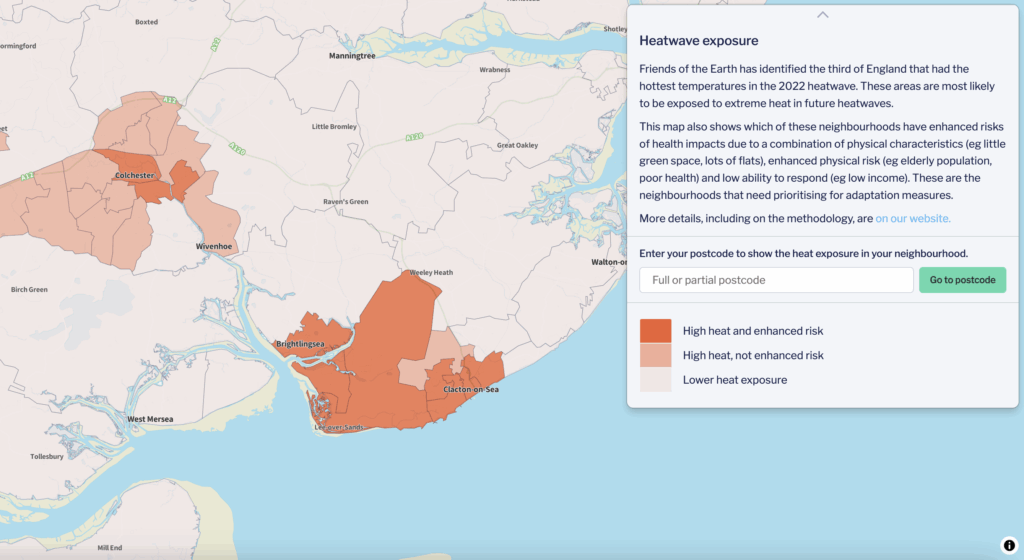Nigel Farage and his fellow Reform UK MPs, many of whom deny basic climate science, represent constituencies exposed to the worst effects of extreme heat, studies show.
The UK has this week entered its fourth heatwave of 2025, with temperatures expected to rise to 33C on Thursday in what scientists have warned could become the new norm thanks to climate change.
Friends of the Earth research into the 2022 heatwave identified the areas of the country “most likely to be exposed to extreme heat in future heatwaves”. They found “enhanced risks” in certain areas due to a lack of green spaces, the type of housing, as well as the age and socioeconomic circumstances of the local population.
Areas with “high heat and enhanced risk” include those within the constituencies of Reform leader Farage (Clacton), deputy leader Richard Tice (Boston and Skegness), Lee Anderson (Ashfield), and Sarah Pochin (Runcorn and Helsby). They also include parts of Greater Lincolnshire, which elected Reform’s Andrea Jenkyns as its mayor in May.

James Dyson, a senior researcher at the think tank E3G, pointed out that between January 2013 and May 2025, Clacton, Boston, Runcorn, and Ashfield have collectively benefited “from around £130 million of investment in home insulation and modern heating,” which makes “homes more resilient to higher temperatures”.
He added: “Decarbonisation policies, like the mission to decarbonise the electricity grid by 2030 will be crucial for the UK to directly reduce its emissions, and to demonstrate to countries around the world that decarbonisation is possible and desirable. However, with a set level of warming baked in, it’s necessary we adapt to make us resilient to hotter and more extreme weather.”
A report by the insurance giant AXA previously revealed that Tice’s constituency of Boston and Skegness is the second most exposed in England to climate impacts. Boston, and Farage’s seat of Clacton in Essex, are both at risk of flooding due to rising sea levels and the increased frequency of extreme weather events.
A new study by the Resolution Foundation think tank has also warned of heat risks to low-income homes, with nearly 50 percent of homes in the poorest areas likely to get dangerously hot in high temperatures.
Reform campaigns to scrap renewable energy development and ramp up new fossil fuel extraction. More than 90 percent of its funding (£2.3 million) between the last two general elections came from climate science deniers and donors with fossil fuel or polluting interests.
Its treasurer Nick Candy has recently claimed that the party is actively raising money from fossil fuel executives.
Reform’s Climate Science Denial
Reform politicians have also repeatedly spread climate science denial.
In February, Richard Tice told Sky News: “There’s no evidence that man-made CO2 is going to change the climate. Given that it’s gone on for millions of years, it will go on for millions of years.”
Party leader Farage has repeatedly blamed climate change on “sunspot activity” and “underwater volcanoes” – false claims that have long been debunked by experts. At an event in February he said it was “absolutely nuts” for CO2 to be considered a pollutant.
Tice has also claimed that “CO2 is not poison; it’s plant food”.
Last month, Reform mayor Jenkyns said in an interview with Times Radio: “Do I believe that climate change exists? No.”

These claims are contradicted by the overwhelming majority of the world’s experts. Climate scientists at the UN’s Intergovernmental Panel on Climate Change (IPCC), the world’s leading climate science body, have stressed that “it is a statement of fact, we cannot be any more certain; it is unequivocal and indisputable that humans are warming the planet”.
Bob Ward, policy and communications director at the Grantham Research Institute on Climate Change and the Environment at the London School of Economics said: “The denial of climate change by Reform UK MPs means they refuse to confront reality and so cannot be relied on to come up with solutions to the challenges their constituents face. The frequency and intensity of heatwaves is increasing due to climate change, and will continue to grow until the world reaches net zero emissions of greenhouse gases.
“This means there is a rising threat to human health, with thousands of heat-related deaths across the country, and to the economy, with millions of pounds lost through lower productivity. But Reform cannot accept this reality, and oppose net zero, meaning they are apparently happy for their constituents to experience unlimited damage to their lives and livelihoods.”
Reform claims to have saved £100 million after gaining control of 10 councils in May’s local elections, primarily by scrapping climate policies.
The party’s policy on extreme heat is unclear. It has campaigned against heat pumps, the electricity-powered devices which can be used to cool homes as well as heat them. Farage has openly criticised the move towards heat pumps, claiming on GB News they are “a rich man’s game”.
Shaun Spiers, executive director of the Green Alliance think tank, told DeSmog: “Extreme weather due to climate change is threatening lives and livelihoods across the UK. Excess heat led to 3,000 deaths in 2022. It’s estimated that flooding costs us £2.4 billion each year, and scientists say that extreme weather is becoming the norm in the UK.”
He added: “Reform like to talk about net zero policies but they have absolutely nothing to say about the climate crisis, the effects of which are becoming ever more apparent every day. What would they do about it? And do they really want to axe the thousands of good jobs being created as the country transitions to cleaner and more secure energy?”
Polling in the UK consistently finds between 60 and 70 percent of the public is worried about climate change and believes it is caused by human activity.
In Farage’s constituency of Clacton, 68 percent of the public is worried about rising temperatures, according to a YouGov poll from last August – slightly above the national average of 66 percent.
New polling by YouGov for Friends of the Earth found that two-thirds of Reform voters strongly support or tend to support building more renewable energy projects.
By contrast, Reform has put energy companies “on notice” – saying their renewable energy subsidies will be scrapped if Farage enters 10 Downing Street.
A recent report by the New Economics Foundation found that Reform’s climate policies would cost more than 60,000 jobs and wipe £92 billion off the UK economy.
Subscribe to our newsletter
Stay up to date with DeSmog news and alerts






